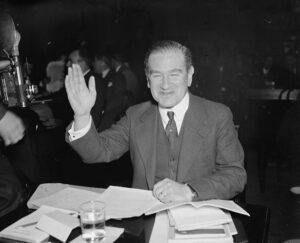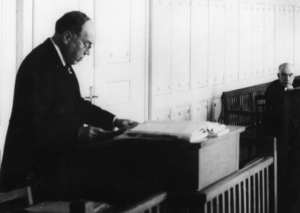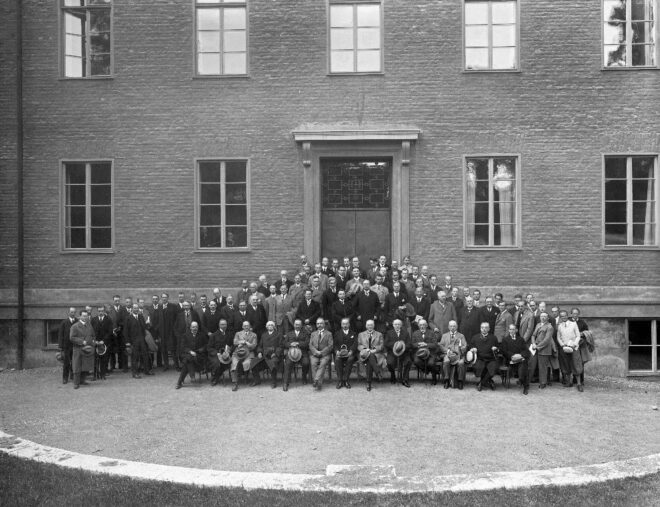In 1926, a short note in the renowned American Journal of International Law announced the foundation of the Kaiser-Wilhelm-Institute for Foreign Public Law and International Law (KWI). The note announced Viktor Bruns as director of the KWI, who together with two colleagues from the Law Faculty at the University of Berlin, Rudolf Smend and Heinrich Triepel would lead the KWI. It outlined that the KWI would research public law and international law for “scientific and practical governmental purposes”, and that publications would follow and hopefully make “valuable contributions” to international law in the future.[1] This rather general note about the KWI was the only one in any Anglo-American law journal at the time. This article examines the KWI’s perception in the Anglo-American legal community in the interwar period but also looks at the broader trend of the foundation of national and regional law institutions in the period of the First World War.
The Invisible KWI
It was not until 1929, three years after the initial note, that the KWI began to reach a broader audience in the Anglo-American legal community, particularly in the United States, with the journals Zeitschrift für ausländisches öffentliches Recht und Völkerrecht (“Journal for Foreign Public Law and International Law”, today: Heidelberg Journal of International Law) from 1929 and the Fontes Juris Gentium from 1931. The first editions of the KWI’s publications won acclaim in the review sections of Anglo-American law journals. Eminent American jurists, such as Manley O. Hudson, Law Professor at Harvard University, and Philipp C. Jessup, Law Professor at Columbia University, reviewed these German publications in the most important law journals in the United States. Both lawyers were not only known in academic circles but also regularly advised the US government in legal matters. Manley O. Hudson wrote in the American Journal of International Law that the Fontes Juris Gentium were a “monumental undertaking” which gave “new significance to the reality of international law”.[2] Philipp C. Jessup welcomed the Fontes Juris Gentium in the Political Science Quarterly, stating the publication provided a “survey of international practice”, which would be greeted with a “warm and grateful applause”.[3] Another colleague, Charles G. Fentwick of Bryn Mawr College hoped that not only students but also governments would make use of the Fontes Juris Gentium.[4] However, while the KWI’s publications were read with great interest in the United States, the Fontes Juris Gentium received rather mixed reviews in British law journals. In the British Year Book of 1932 British jurist, James L. Brierly, Chichele Professor of International Law and Diplomacy at the University of Oxford, felt it was “not easy to express an opinion” on the Fontes Juris Gentium because of the enormous scope of the project, which included translations, extracts, and digests of national and international judgements.[5]

Edwin Borchard before the Senate Judiciary Committee 1937[6]
The reviews also mentioned the KWI as the publications’ editor, although the Kaiser-Wilhelm-Society was not mentioned. Abraham Howard Feller of Harvard University, who had also worked at the KWI and was part of the editorial team of the Fontes Juris Gentium, expressed his hope that the KWI would play an “increasingly large part in international legal life”.[7] Edwin Borchard, a Law Professor at Yale University, wrote the most enthusiastic and extensive review about the KWI and its publications in the American Journal of International Law. Therein, Borchard praised the foundation of the KWI as “an epoch-making event”, and portrayed the KWI as an example for other future research institutes and imagined a cooperation amongst them.[8] His praise may not have been without self-interest, though. Borchard himself contributed to the first edition of the Journal with an article entitled “The Kellogg Treaties Sanction War”.[9] As one of the first American law professors, Borchard lectured at Berlin University in 1925 and he was a close friend of Viktor Bruns. Borchard also belonged to a group of American intellectuals who favoured American non-intervention in the First and Second World Wars.[10]
Traditions of Legal Institutions
The foundation of the KWI also has to be seen in the broader context of the foundation of other national and regional institutions of international law prior to and during the First World War. All institutions served the scientific community as well as governments in building understanding of the role of international law in international politics and ways in which states could use international law as an instrument to serve national interests while simultaneously fitting into an increasingly internationalised world. For instance, the American Institute of International Law, founded in 1912, aimed to understand the role of international law in the formation of an international society in the Americas. The hemispheric approach aimed to develop international law, which more specifically served the needs of the Americas.[11] In fact, the Institute particularly served US imperial policy in Latin and South America.[12]
The First World War led to a temporary suspension of the work of international law organisations, such as the Institut de Droit International (IDI) and the International Law Association, whose aim was to advance the codification of international law by collecting and analysing various national laws and practices, and to find a common ground for international norms.[13] But with the suspension of these organisations, the closely-knit networks of international lawyers saw the creation of new national organisations. In 1915, the Grotius Society was founded in Great Britain with the aim of studying the developments of international law during the war. In its wartime publication Problems of the War, academics and law practitioners discussed pressing themes, which emerged from the war, such as neutrality, blockade, reprisals, prisoners of war, and enemy merchantmen. Membership was confined to British citizens (although some exceptions could be made) and the majority of articles reflected allied perspectives.[14] The Society’s Vice-President, Henry Goudy, who held one of the most prestigious academic positions as Regius Professor of Civil Law at the University of Oxford, wrote that it was a “purely British Society”.[15] Goudy eagerly emphasised that the Society’s goal was to “treat all international questions in an absolutely independent spirit”, yet followed this claim by a long list of Germany’s violations of international law.[16]
Politics and International Law
The example of the Grotius Society signalled the broader question that concerned the international law community in both war and peace time: the relationship between politics and international law. In 1873, the founding members of the IDI intensely debated how they should position themselves as an academic society between politics and international law. The IDI’s statutes initially stated that active members were not allowed to execute political mandates.[17] Yet, this clause was soon dropped when the members of the IDI realised that international norms could only be developed with the involvement of national parliaments and governments.[18] It showed, crucially, that national and international legal norms were constituted at the same time.

Viktor Bruns, 1937[19]
The end of the First World War, too, demonstrated that politics and international law were closely intertwined.[20] The Versailles Treaty system created an international post-war order with the League of Nations and the Permanent Court of International Justice (PCIJ) at its heart.[21] The foundation of the KWI reflected the need of the German government to develop expertise and knowledge in the field of international law which would enable it to effectively defend Germany’s interests in the Versailles Treaty system. Thus, it is not surprising that the KWI primarily focused on reparations and occupation.[22] In fact, with Germany’s admission to the League of Nations in 1926, active participation in the new international order was desirable for Germany. And yet, German politicians and the German public were sceptical of the League’s ability to respond to German interests, as were many lawyers.[23] Despite that, the director of the KWI, Viktor Bruns, earned his reputation as a German representative at the PCIJ and as a judge in several mixed arbitration commissions during the interwar period.[24]
The KWI as an “epoch-making event”?
The KWI was part of a broader trend, which was happening at the same time in the Anglo-American research community, regarding the foundation of international law institutions to understand the international order by examining international law from national and regional perspectives. The institutions pursued similar aims, scope, and methods to examine and comment on an increasingly internationalised world, which strengthened, but also limited, the sovereignty of states.[25] The oscillation between the international and national sphere characterised the interwar period and, more often than not, the two complemented rather than opposed each other.[26] Lively discussions took place in the international law community on wartime developments of international law, the post-war order, the Versailles Treaty, the relationship of states and the League of Nations as well as the PCIJ.[27] The foundation of the KWI was not only an epoch-making event, it was also a response to the challenges of the interwar period, which redefined the relationship between states and the international sphere, and, moreover, the role of international law in politics.
[1] Institut für Ausländisches Öffentliches Recht und Völkerrecht, AJIL20 (1926), 357.
[2] Manley O. Hudson, Review: Fontes Juris Gentium by Viktor Bruns, Ernst Schmitz, A.H. Feller and B. Schenk Graf von Stauffenberg, AJIL 25 (1931), 795-796.
[3] Philip C. Jessup, Review: Fontes Juris Gentium. Series A. Sectio 1. Tomus 1 and 2. Sectio 2, Tomus 1, edited by Viktor Bruns, Political Science Quarterly 47 (1932), 296-299 (97, 99).
[4] Charles G. Fentwick, Review: Fontes Juris Gentium, ed. by Viktor Bruns, The University of Pennsylvania Law Review 81 (1932), 238-239.
[5] James L. Brierly, Review: Fontes Juris Gentium, ed. by Viktor Bruns, British Year Book of International Law 13 (1932), 199-201 (200); For a more sympathetic review, see: Wyndham A. Bewes, Review: Fontes Juris Gentium, ed. by Viktor Bruns, International Affairs 12 (1933), 397.
[7] Abraham H. Feller, Review: Zeitschrift für ausländisches öffentliches Recht und Völkerrecht, edited by Viktor Bruns and others, Harvard Law Review 43 (1930), 851.
[8] Edwin M. Borchard, Institut für Ausländisches Öffentliches Recht und Völkerrecht, AJIL 24 (1930), 587-591.
[9] Edwin M. Borchard, “The Kellogg Treaties Sanction War,” HJIL 1 (1929), 126-131.
[10] Hatsue Shinohara, US International Lawyers in the Interwar Years. A Forgotten Crusade, Cambridge: Cambridge University Press 2012, 17-24, 124-131.
[11] Constitution of the American Institute of International Law, in: James Brown Scott (ed.): American Institute of International Law: Its Declaration of the Rights and Duties of Nations, Washington, D.C.: The American Institute of International Law 1916, 107-116, Article II: 107-108.
[12]Juan Pablo Scarfi, The Hidden History of International Law in the Americas. Empire and Legal Networks, Oxford: Oxford University Press 2017, 33, 37-38.
[13] Gabriela A. Frei, The Institut de Droit International and the Making of Law for Peace, 1899-1917, in: Remi Fabre (ed.), Les défenseurs de la paix (1899-1917), Rennes: Presses Universitaires de Rennes 2018, 133.
[14] The Grotius Society. Founded 1915. Rules, Problems of the War 1 (1915), vii-ix.
[15] Henry Goudy, Introduction, Problems of the War 1 (1915), 1-7 (1).
[16] Goudy (fn. 15), 2.
[17] Statuts votés par la Conférence Juridique internationale de Gand, le 10 Septembre 1873, Annuaire de l’institut de droit international 1 (1877), 1-4.
[18] Revision des statuts – Règlements nouveaux, Annuaire de l’institut de droit international 9 (1887-88), 357.
[19] AMPG, Berlin.
[20] Marcus M. Payk, Frieden durch Recht? Der Aufstieg des modernen Völkerrechts und der Friedensschluss nach dem Ersten Weltkrieg, Oldenbourg: De Gruyter 2018, 495-653.
[21] Dan Gorman, Cooperation, Conflict, and International Order: Lessons from the Post-WW1 Settlement, in: Seth Center/Emma Bates, After Disruption: Historical Perspectives on the Future of International Order, Washington D.C.: Center for Strategic and International Studies 2020, 24-59 (25-27).
[22] Felix Lange, Between Systematization and Expertise for Foreign Policy: The Practice-Oriented Approach in Germany’s International Legal Scholarship (1920-1980), EJIL 28 (2017), 538-540 (543-544).
[23] Christoph M. Kimmich, Germany and the League of Nations, Chicago: University of Chicago Press 1976, 94-105; Martti Koskenniemi, The Gentle Civilizer of Nations. The Rise and Fall of International Law 1870-1960, Cambridge: Cambridge University Press 2001, 236-238.
[24] Viktor Bruns, La Cour Permanente de Justice Internationale. Son Organisation et sa Compétence, in: Hague Academy of International Law (ed.), Recueil des cours – Collected Courses of the Hague Academy of International Law, vol. 62, Leiden: Brill 1937, 549-670; Heinrich Triepel, Nachruf Viktor Bruns, HJIL 11 (1942/43): 324a-324d.
[25] Leonard V. Smith, Sovereignty at the Paris Peace Conference of 1919, Oxford: Oxford University Press 2018, 260-262.
[26] Glenda Sluga, Internationalism in the Age of Nationalism, Philadelphia: University of Pennsylvania Press 2013; Glenda Sluga/Patricia Clavin, Rethinking the History of Internationalism, in: Glenda Sluga/Patricia Clavin, Internationalisms. A Twentieth-Century History, Cambridge: Cambridge University Press 2017, 3-13.
[27] Geoffrey Butler, Sovereignty and the League of Nations, British Year Book of International Law 1 (1920/21), 35-44; Arthur Baumgarten, Souveränität und Völkerrecht, HJIL 2 (1929), 305-334; Jesse S. Reeves, International Society and International Law, AJIL 15 (1921), 361-374.
|
Suggested Citation: Gabriela Frei, “An epoch-making event”? The Foundation of the Kaiser-Wilhelm-Institute and the Anglo-American Research Community, 1912-1933, MPIL100.de, DOI: 10.17176/20240403-174131-0. |
|
| Lizenz: CC BY-NC-SA 4.0 DEED | |

Gabriela A. Frei (DPhil, Oxford) is an Associate Member of the Faculty of History at the University of Oxford, UK. She teaches modern European and international history. Her research focuses on the interaction between international law, trade, and strategy in international politics of the nineteenth and twentieth centuries.


